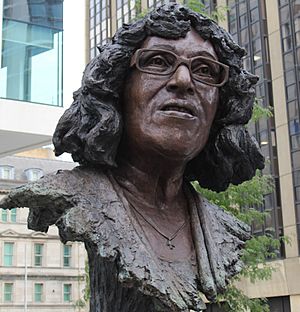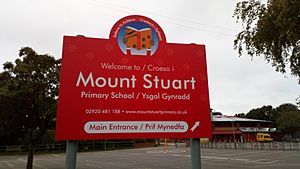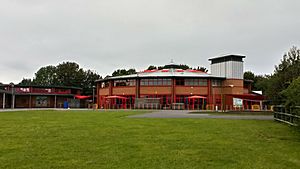Betty Campbell facts for kids
Quick facts for kids
Betty Campbell
|
|
|---|---|

Statue of Betty Campbell, Cardiff
|
|
| Born |
Rachel Elizabeth Johnson
6 November 1934 Butetown, Cardiff, Wales
|
| Died | 13 October 2017 (aged 82) Butetown, Cardiff, Wales
|
| Nationality | Welsh |
| Education | Lady Margaret High School for Girls, Cardiff |
| Alma mater | Cardiff Teacher Training College |
| Occupation | Head teacher |
| Employer | Mount Stuart Primary School |
| Organization | Commission for Racial Equality (member) Cardiff Councillor (1991–1995; 1999–2004) |
| Title | Head teacher of Mount Stuart Primary School |
Betty Campbell MBE (6 November 1934 – 13 October 2017) was a special Welsh community leader. She made history as Wales' first black head teacher. Born as Rachel Elizabeth Johnson, she grew up in Butetown, Cardiff. Betty won a scholarship to a good school and later became a teacher. She eventually led Mount Stuart Primary School, where she brought in new and exciting ways to teach children. She was also very active in her community.
Contents
Early Life and Education
Betty Campbell was born Rachel Elizabeth Johnson in Butetown, Cardiff, in 1934. This area was once known as Tiger Bay. It was one of the first places in the UK with many different cultures living together.
Betty's mother, Honora (Nora), was from Barbados. Her father, Simon Vickers Johnson, came to the UK from Jamaica. He was sadly killed in World War II in 1942 when his ship was attacked. After her father's death, Betty's mother worked hard to support the family.
Betty was a very bright student and was always at the top of her class. She won a scholarship to the Lady Margaret High School for Girls in Cardiff. From a young age, she dreamed of becoming a teacher. However, one of her teachers told her it would be "insurmountable" for a working-class black girl to achieve this. This made Betty sad, but it also made her even more determined to reach her goals.
Career and Community Work
Betty Johnson started her family young. She left school when she married Rupert Campbell in 1953. Betty and Rupert had four children, and later 14 grandchildren and 17 great-grandchildren.
In 1960, when Betty already had three children, she learned that Cardiff Teacher Training College was accepting female students. Betty applied and was one of only six women to be accepted.
Betty's first teaching job was in Llanrumney. Soon after, she returned to Butetown and began teaching at Mount Stuart Primary School. She taught there for 28 years. As a black teacher, she sometimes faced unkindness from some parents. She later said, "They hadn't seen a black teacher before. It was as if you could do a job, but if you’re black you weren’t quite as good."
Betty was inspired by a trip to the United States. There, she learned about brave anti-slavery heroes like Harriet Tubman and the Civil Rights Movement. When Betty became Wales' first black head teacher at Mount Stuart in the 1970s, she started teaching children important topics. These included the history of slavery, black history, and the unfair system of apartheid in South Africa.
Betty Campbell also helped create Black History Month in the UK. She led workshops about the important role of Butetown's people and their home countries during the Second World War.
She also served as a local councillor for Butetown on Cardiff Council. This meant she helped make decisions for her community from 1991 to 1995, and again from 1999 to 2004.
Influence and Recognition
Under Betty Campbell's leadership, Mount Stuart School became well-known across the United Kingdom. It was seen as a great example of how to teach children from many different backgrounds. Betty became a member of important groups, like the Home Office's race advisory committee and the Commission for Racial Equality.
In 1994, Prince Charles visited Mount Stuart School for its annual St David's Day celebration. In 1998, Betty was invited to meet Nelson Mandela when he visited Wales. This was a huge honor.
She was also part of the Paul Hamlyn Foundation Commission on Education. This group wrote research papers on education. In 1993, their book "Learning to Succeed" highlighted the great teaching methods used at Mount Stuart Primary School.
Betty was a board member of BBC Wales in the 1980s. She was also given an honorary fellowship from Cardiff Metropolitan University. In 2003, she received an MBE award for her amazing work in education and for her community. In 2015, she received a lifetime achievement award from Unison Cymru's Black Members' group. This was for her contributions to black history and Welsh education.
Death and Legacy
Betty Campbell passed away on 13 October 2017, at the age of 82. She had been ill for several months. Hundreds of people lined the streets of Cardiff to show their respect. The First Minister of Wales, Carwyn Jones, called Betty Campbell "a true pioneer" and an "inspiration" to many.
Statue in Cardiff
Soon after Betty's death, people called for a statue to be built in her memory. At the time, the only statue of a real woman in Cardiff was of Boudica, an ancient queen. This was very different from the many statues of famous men. So, a group called 'Monumental Welsh Women' was formed to help fix this imbalance.
On 18 January 2019, it was announced that Betty Campbell had won a public vote to have a statue built in Cardiff. She was chosen from a list of other amazing Welsh women. Her statue was planned for Central Square. The sculptor Eve Shepherd was chosen to create it. After some delays, the statue was finally unveiled on 29 September 2021. In 2022, an image of the statue even appeared in the video for the official Wales World Cup song, Yma o Hyd.
See also
- Beryl Gilroy, the first black headteacher in London
 | Tommie Smith |
 | Simone Manuel |
 | Shani Davis |
 | Simone Biles |
 | Alice Coachman |



